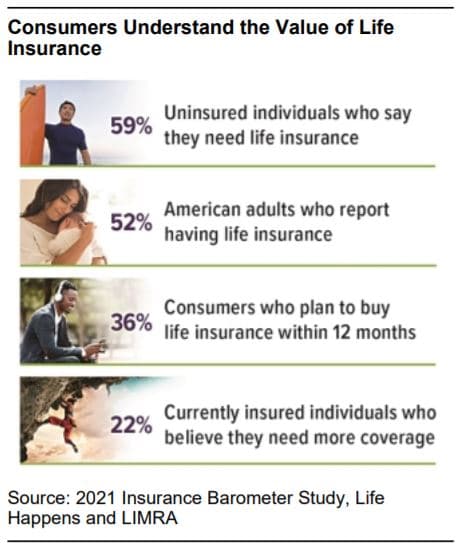You may have purchased life insurance years ago and never gave it a second thought. Or perhaps you don’t have life insurance at all and now you need it. When your life circumstances change, you have a fresh opportunity to make sure the people you love are protected.
Marriage
When you were single, life insurance might have seemed like an unnecessary expense, but now someone else is depending on your income. If something happens to you, your spouse will likely need to rely on life insurance benefits to meet expenses and pay off debts.
The amount of life insurance coverage you need depends on your income, your debts and assets, your financial goals, and other personal factors. Even if you have some low-cost life insurance through work, this might not be enough. Buying life insurance coverage through a private insurer could help fill the gap.
Parenthood
When children arrive, revisiting your life insurance needs could help you protect your growing family’s financial security. Life insurance proceeds might help your family meet both their current obligations, such as a mortgage, childcare, or car payments, and future expenses, including a child’s college education. Even if you already have life insurance, children are among the most important reasons to review your policy limits and beneficiary designations.
Retirement
As you prepare to leave the workforce, reevaluate your need for life insurance. You might think that you can do without it if you’ve paid off all of your debts and feel financially secure. But if you’re like some retirees, your financial picture may not be so rosy, especially if you’re still saddled with mortgage payments, student loan bills, and other obligations. Life insurance protection could still be important if you haven’t accumulated sufficient assets to provide for your family, or you want to replace retirement income lost when you are no longer around.
Life insurance can also be an important tool to help you transfer wealth to the next generation. Or perhaps you’re looking for a way to pay your estate tax bill or leave something to charity. You may need to keep some of your life insurance in force or buy a different type of coverage.
Health Changes
A common concern is that life insurance coverage will end if your insurer finds out that your health has declined. But if you’ve been paying your premiums, changes to your health will not matter.
Some life insurance policies even offer accelerated (living) benefits that you can access in the event of a serious or long-term illness.
You may be able to buy additional life insurance if you need it, especially if you purchase group insurance through your employer during an open enrollment period. Purchasing an individual policy might be more difficult and more expensive, but check with your insurance representative to explore your options.
Of course, it’s also possible that your health has improved. For example, perhaps you’ve stopped smoking or lost a significant amount of weight. If so, you may now qualify for a lower premium.
The cost and availability of life insurance depend on factors such as age, health, and the type and amount of insurance purchased. Before implementing a strategy involving life insurance, it would be prudent to make sure that you are insurable. As with most financial decisions, there are expenses associated with the purchase of life insurance. Policies commonly have mortality and expense charges. Any guarantees are contingent on the financial strength and claims-paying ability of the issuing insurance company. Optional benefits are available for an additional cost and are subject to contractual terms, conditions, and limitations.
If you have questions or need assistance, contact the Experts at Henssler Financial:
- Experts Request Form
- Email: experts@henssler.com
- Phone: 770-429-9166
Disclosures: The following information is reprinted with permission from Forefield, a division of Broadridge Financial Solutions, Inc. The investments referenced within this article may currently be traded by Henssler Financial. All material presented is compiled from sources believed to be reliable and current, but accuracy cannot be guaranteed. The contents are intended for general information purposes only. Information provided should not be the sole basis in making any decisions and is not intended to replace the advice of a qualified professional, such as a tax consultant, insurance adviser or attorney. Although this material is designed to provide accurate and authoritative information with respect to the subject matter, it may not apply in all situations. Readers are urged to consult with their adviser concerning specific situations and questions. This is not to be construed as an offer to buy or sell any financial instruments. It is not our intention to state, indicate or imply in any manner that current or past results are indicative of future profitability or expectations. As with all investments, there are associated inherent risks. Please obtain and review all financial material carefully before investing. Henssler is not licensed to offer or sell insurance products, and this overview is not to be construed as an offer to purchase any insurance products.









